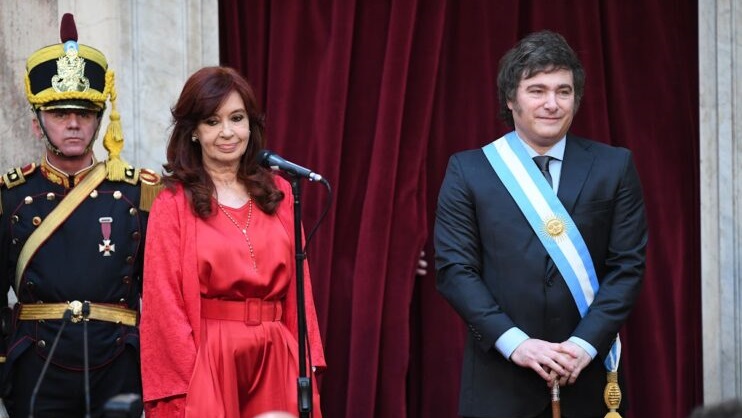
Threats and winks go hand in hand; They are part of tense negotiations between the national government and the main parliamentary bloc. The themes seem essentially three. On the one hand, the formation of the Supreme Court of Justicewhere the Government has been aiming for months to create an addicted majority through the appointment of Ariel Lijo and Manuel García Mansilla. On the other hand, the call Clean Record Lawwhich has the PRO as its main promoter and which was not discussed this Thursday due to lack of quorum in Deputies. Finally, everything seems to indicate that Negotiations are also underway around the reactionary political reform promoted by the Government.a rule that, if passed, would imply the electoral banning of the left and other forces.
The first topic has been public for a long time. He Government intends to install Lijo and García Mansilla in the highest court. He Kirchnerism seems willing to negotiate. This was evidenced by the signature by Lucia Corpacci of the opinion necessary to deal with the magistrate’s document. The former governor of Catamarca is currently vice president of the PJ and a leader who is more than close to Cristina Kirchner. The decision of the national senator formed a signal towards the ruling party. However, the Milei government insists on the joint document, something that Peronism does not seem to endorse.
For days now, the ruling party has been pointing out that, if negotiations in the Upper House are blocked, it could appoint both judges to the commission. This is what Mauricio Macri did in 2016, bypassing Congress. The decision implies an authoritarian act of a Bonapartist nature.
From Peronism, the bloc senators headed by José Mayans came out to reject the threat. He did so through a letter that he delivered to the Chief of Staff, in which he assumed the “public commitment to promote the immediate rejection of the document of Agreement of any person who accepts to be appointed as a judge of the Supreme Court of Justice of the Nation ‘in commission’ under the supposed protection of the terms of article 99, paragraph 19 of the National Constitution.”
However, also this Wednesday, the same Guillermo Francos, in his presentation before the Senate, left open a door to continue negotiating. In response to a question, in his presentation he indicated that “it will surely be an issue that the president will consider in the event that these documents do not finally advance, he will also take into account the claims that have been made regarding the participation of women in the Court.”
Clean record
At the same time, although with a much lower level of exposure, the ruling party and Milei negotiate around of the Clean Record rulepromoted by the PRO and other blocks of the so-called “republican” opposition. It was on the agenda this Thursday in a session of the Lower House that did not achieve a quorum. Among the absences were deputies from La Libertad Avanza.
There is no session for a Clean Card. Several absences from La Libertad Avanza again. pic.twitter.com/2cY1UsIkGC
— Jesica Calcagno (@Jesi_mc) November 28, 2024
As has been pointed out, the rule has a proscriptive nature, since it leaves in the hands of the Judiciary – a completely arbitrary power – the possibility or not that certain people can be candidates if they have convictions against them. If sanctioned, The rule could clearly impact Cristina Kirchnerwhich comes from receiving a more than questionable sentence in the so-called Road Cause.
It is precisely that rule that Kirchnerism wants to avoid. The officialdomfor its part, carries out a double game. While Milei has publicly celebrated the conviction of the former vice president for the Highways case, a few days ago Guillermo Francos said that the norm could not be understood as a “law against Cristina Kirchner.” The official absences in this Thursday’s session are closer to these statements by the Chief of Staff than to the president’s high-sounding messages.
Authoritarian political reform
The last ground on which there would be a negotiation it would be that of proscriptive political reform promoted by the national government. Using demagoguery in relation to the elimination of the PASO, the ruling party seeks a rule that directly privatizes electoral activity, allowing the parties supported by big businessmen to be the only ones that can compete in each election.
This Wednesday in the Chamber of Deputies, the Left Front denounced this authoritarian mechanism that could be imposed. It was Christian Castillo who was in charge of pointing out that with this rule “the Government tries to suppress the parties that exist today. “It is a plain and simple attempt to proscribe a part of the political system.”
A few days ago, in Cenital, journalist Iván Schargrodsky stated that Cristina Kirchner and Kirchnerism “look fondly” at the elimination of the PASO. That is, they would be open to negotiating Milei’s authoritarian political reform.
This criticism was also made by the left this Wednesday. Already at the end of the session, the also PTS-FITU deputy, Nicolás del Caño, harshly criticized: “We have read in the media that sectors of Unión por la Patria and other blocs would be discussing this reform.”
The defensive response came from the head of the Unión por la Patria bloc of deputies. German Martinez He responded by saying that if there is an agreement, “we are going to claim it in public or not, as we have always done every time we make a political agreement.” In his words, The Santa Fe deputy seems to confirm the negotiations. It only indicates that they will not be made public yet.
It is Negotiations occur completely behind the backs of the working majoritieswho meanwhile suffer a fierce adjustment to their living conditions.
Source: www.laizquierdadiario.com

